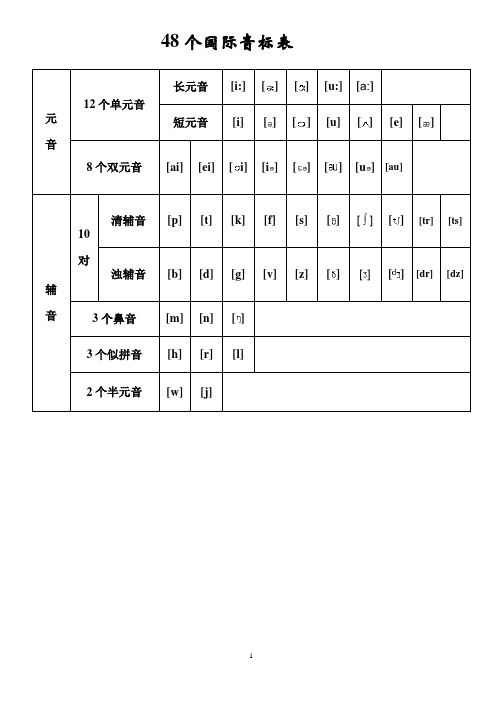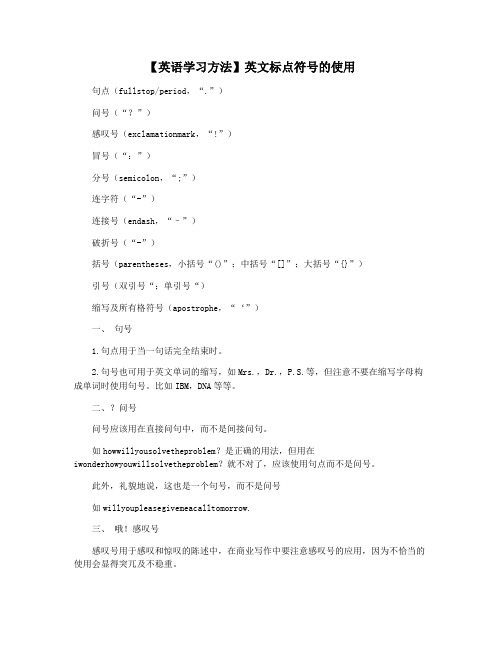英文标点,板上钉钉用英语怎么说
英语48个国际音标表——英语学习的开端,更是基础!

48个国际音标表[[[[[][[i][[[[[[[一.前元音/i:/疯狂外号:穿针引线长衣音,简称“长衣音”(抒情音)发音要领的是:舌尖抵下齿,舌前部抬高,舌两侧抵上齿两侧,口形偏平。
e:Chinese 中国人extremely 极其地ee:feeling 感情agree 同意ei:receive 接到conceive 设想ea:please 请dream 梦;梦想ie:achieve 达到believe 相信实用操练:1.Speaking English is a piece of cake.说英语是小菜一碟2.. Please feel free to call me.请随时给我打电话。
3.I'm glad to meet you.我很高兴见到你/见到你很高兴4.Seeing is believing.眼见为实。
额外奉献:这是一个非常好用的句型:Please feel free to ...(请尽管.../请随时...)1. Please feel free to visit anytime.请尽管随时采访。
2 . Please feel free to ask for any help anytime.二.前元音美语音标/i/疯狂外号:经典收小腹减肥短衣音,简称“短衣音”发音要领是发音时舌尖抵下齿,前舌尽量抬高、舌位高于/i/:口形扁平。
i: visit 参观limit 限制e: english英语ticket车票u: busy忙ee: been曾经是y: pretty漂亮的difficulty困难ui: build建造实用操练:Where there is a will, there is a way.有志者事竟成。
Nothing is impossible to a willing heart.心之所愿,无事不成。
2. I'm pretty busy.我很忙。
3. A good beginning makes for a good ending.好的开始导致好的结尾。
四级英文谚语(中英对照)(推荐五篇)

四级英文谚语(中英对照)(推荐五篇)第一篇:四级英文谚语(中英对照)Where there is a will, there is a way.有志者,事竟成。
Nothing is too difficult, if you put your heart into it.世上无难事,只怕有心人。
As every thread of gold is valuable, so every moment of time.一寸光阴一寸金。
All things in their being are good for something.天生我才必有用。
There is nothing permanent except change.唯有变化才是永恒的。
A crooked stick will have a crooked shadow.身不正,影必斜。
Wisdom is to the mind what health is to the body.知识之于心灵正如健康之于身体。
A word once spoken cannot be taken back even by a team of four horses.一言既出,驷马难追。
Very often a change of self is needed more than a change of scene.改变自己往往比改变环境更为需要。
A man is not old as long as he is seeking something.A man is not old until regrets take the place of dreams.只要一个人还有所追求,他就没有老。
直到后悔取代了梦想,一个人才算老。
Better an egg today than a hen tomorrow.今日一只蛋,胜过明天一只鸡。
There is no friend so faithful as a good book.最忠实的朋友莫过于一本好书。
【英语学习方法】英文标点符号的使用

【英语学习方法】英文标点符号的使用句点(fullstop/period,“.”)问号(“?”)感叹号(exclamationmark,“!”)冒号(“:”)分号(semicolon,“;”)连字符(“-”)连接号(endash,“–”)破折号(“-”)括号(parentheses,小括号“()”;中括号“[]”;大括号“{}”)引号(双引号“;单引号“)缩写及所有格符号(apostrophe,“‘”)一、句号1.句点用于当一句话完全结束时。
2.句号也可用于英文单词的缩写,如Mrs.,Dr.,P.S.等,但注意不要在缩写字母构成单词时使用句号。
比如IBM,DNA等等。
二、?问号问号应该用在直接问句中,而不是间接问句。
如howwillyousolvetheproblem?是正确的用法,但用在iwonderhowyouwillsolvetheproblem?就不对了,应该使用句点而不是问号。
此外,礼貌地说,这也是一个句号,而不是问号如willyoupleasegivemeacalltomorrow.三、哦!感叹号感叹号用于感叹和惊叹的陈述中,在商业写作中要注意感叹号的应用,因为不恰当的使用会显得突兀及不稳重。
四、(a);分号1.与中文一样,分号用于分隔地位平等的独立子句。
在某些情况下,使用分号比使用句点更显出子句之间的紧密联系,另外分号也经常与连接副词thus,however,therefore一起使用(放在这些词语之前)。
如ire alizeineedexercise;however,i’llliedownfirsttothinkaboutit.2.如果句子中使用逗号,分号用于分隔类似内容,以避免歧义。
例如,员工是经理汤姆·汉克斯;工程师吉姆怀特;还有Dr。
杰克莉。
需要注意的是:一个完整的句子以大写字母开始,以句点结束。
写英文时用逗点代替句点、分号、冒号或破折号叫“逗号错”,这正是中国学生所要避免的。
新译林版高一英语必修二Unit2 单词和短语

Unit 21.soccer n <美>足球运动[U]☆同义词:football2.bat n 蝙蝠[C];球棒,球板[C]vt&vi 用球棒(板)击球(batting/batted)baseball bat 棒球棒at bat 轮到击球☆batter n 击球手[C]3.skydiving n 跳伞运动[U]4.congratulation n 祝贺,恭喜;贺词;恭敬[pl.] Congratulations!祝贺你(口语)congratulations to sb on sth祝贺某人某事offer/send congratulations to sb (on sth) 向某人祝贺(某事)☆congratulate v 祝贺,向......致贺辞,向......道喜congratulate sb on/upon sth/doing sth 就某事向某人祝贺5.assume vt 假定,认为;承担(责任),就职;呈现,显露assume sb/sth to be认为某人/某事.......assuming (that)... 假设......(引导条件状语从句)It is assumed that...人们认为......☆assumption n 假定[C];设想;担任[C,U];采取on the assumption that... 假定......make the assumption that... 假定.....6.do wonders创造奇迹,产生神奇作用☆wonder vt 想知道vi 吃惊;惊讶wonder whether(if)/when/why/how... 想知道是否/什么时候/为什么/怎么......wonder to do sth惊讶(奇怪)做某事wonder at... 对......感到惊讶n 奇迹[C];惊讶[U]No wonder (that)... = It’s no wonder (that)...难怪......;......不足为奇in wonder 惊奇地It’s a wonder that.........真是个奇迹7.lung n 肺[C]☆lunger n 肺结核患者[C]lung cancer 肺癌8.over the long term长期9.tend vi 往往会;趋向vt 照看tend to do sth常常会做某事;倾向于做某事tend to/towards... 趋向......;倾向......tend (to) sb/sth 照顾某人/某事;护理某人/某事☆tendency n 倾向;偏好[C]have a tendency to do sth 倾向于做某事10.immune adj 有免疫力的;不受影响的;免除的immune system 免疫系统immune response 免疫反应☆immunity n 免疫力[C,U]11.disease n 病,疾病[C]heart disease 心脏病☆同义词:illness,sickness12.moreover adv 此外,而且☆同义词:in addition,besides,additionally13.reduce vt 减少,缩小☆同义词:shorten,weaken,cut down,fall off 14.routine n 常规,惯例[C,U]adj 常规的,例行的;乏味的routine work 日常工作;常规作业☆routinely adv 例行公事地;老一套地15.muscle n 肌肉,肌[C,U]muscle strength 肌肉强度☆muscular adj 肌肉的;强健的musculature n 肌肉组织[U]16.aerobic adj 有氧的;需氧的aerobic exercise 有氧运动aerobic bacteria 好氧细菌17.jogging n 慢跑锻炼[U]18.skiing n 滑雪(运动)[U]19.pull-up n 引体向上[usually pl.]20.bone n 骨头,骨[C]bone marrow 骨髓bone fracture 骨折☆bony adj 瘦骨嶙峋的21.gymnastics n 体操,体操训练[U]22.tai chi n 太极拳,太极[U]23.stretch vt&vi 伸展,舒展;拉长;伸出;(使)延伸stretch oneself伸展身体;伸懒腰stretch out伸手24.range n (变动或浮动的)范围,界限,区间[C];一系列[C]a range of一系列;一些;一套a wide range of 大范围的;许多各种各样的25.movement n 活动,转动;移动;运动[C,U]☆move n 移动[sing];步骤[C] vt 搬家;感动vi 移动;搬家;离开moved adj 感动的;被移动的moving adj 移动的;动人的;活动的26.stick with持续,坚持☆stick out 伸出;突出,明显stick to 坚持(真理等),坚持干(某事);忠于stick up 竖立;向上突出stick up for 为......辩护,支持,拥护27.petrol n 汽油[U]28.carbohydrate n 碳水化合物,糖类[C,U]carbohydrate metabolism 碳水化合物代谢29.energy n 能,能量[U];精力[pl.];能源[U]energy consumption 能量损耗energy conservation 能量守恒;能源节约☆energetic adj 精力充沛的;积极的;有力的energetically adv 精力充沛地30.protein n 蛋白质[C,U]protein content 蛋白质含量high protein 高蛋白31.average n 平均水平,一般水准[sing.]adj 平均的;典型的an average of平均有......the average of ......的平均数up to the average 达到平均水平on (the/an) average 平均;一般地above/below (the) average 在平均水平以上/以下32.throughout prep 自始至终;各处,遍及33.make up for弥补,补偿☆make up 构成;组成;编造;化妆;补上make out 理解;辨认出be made up of 由......构成;组成be made of/from 由......制成34.sweat n 汗水[U]vt&vi 出汗,流汗cold sweat 冷汗no sweat 不费力地☆sweaty adj 出汗的;吃力的;使人出汗的35.injury n 伤害;损伤[C,U]do sb an injury/do an injury to sb伤害某人☆injure v 损害;伤害injured adj 受伤的the injured 伤员get injured 受伤36.prevent vt 阻止,阻碍prevent + 宾语+ (from) doing sth阻止......做☆同义:stop + 宾语+ (from) doing sth 阻止......做keep + 宾语+ (from) doing sth 阻止......做ban + 宾语+ (from) doing sth 禁/止......做37.tissue n (人、动植物细胞的)组织[pl.];(尤指用作手帕的)纸巾,手巾纸[C]soft tissue 软组织tissue culture 组织培养tissue engineering 组织工程学38.equipment n 设备;配备,装备[U]a piece of equipment 一件设备☆equip v 配备;装备equip... with... 用......装备......be equipped with配备有......ck n 缺乏,匮乏,短缺[U,sing.]for lack of 缺乏......;没有......;因缺少......vt&vi 没有,缺乏,不足,短缺lack of缺乏;不足lack for 缺......;不充足☆lacking adj 缺少的;不足的be lacking in 不足;不够;缺少40.maintain vt 维持;维修,保养maintain in... 维持......;保持......maintain world peace 维护世界和平maintain order 维持秩序☆maintainable adj 可维持的;可维修的41.announce vt 宣告,宣布;通知announce sth (to sb) (向某人)宣布/通告某事It is announced that...据宣布......☆announcement n 通知;通告[C]make an announcement 宣布;通知42.put finishing touches to对...进行最后的润色或修饰43.update vt 使现代化,更新;向...提供最新信息n 最新消息[C]update sth 更新某物update sb on... 为某人提供最新......☆out of date 过时的up to date 最新的,时髦的;至今make/have a date with sb 与某人约会set/fix a date 确定日期date back to = date from 追溯于;始于44.in response to对...作出反应;作为对...的回复☆respond vi 回答;响应,有反应respond to 对......作出反应45.replace vt 用...替换;代替,取代;更换,更新replace A with/by B用B代替Atake the place of 代替take one’s place 代替某人;就座in place of 代替......46.athlete n 运动员[C]☆athletic adj 运动的;体格健壮的athleticism n 崇尚运动;竞技热47.boxing n 拳击运动[U]48.champion n 冠军,第一名[C]☆championship n 竞标赛;冠军称号49.court n 球场[C];法院,法庭[C,U];宫廷[C]people’s court 人民法院supreme court 最高法院in court 在法庭上50.under the weather略有不适,不舒服51.plus conj 而且,此外prep 加;和52.nearby adj 附近的,邻近的adv 在附近,不远53.gym n 健身房,体育馆[C]54.partner n 搭档,同伴;伙伴;合伙人[C]55.position n 处境[C];位置[C];姿势[C];观点[C];地位[C]leading position 基础地位;首要地位geographical position 地理位置in position 就位;在适当的位置;在原位56.hesitate vi 犹豫,迟疑hesitate to do sth迟疑做某事;不愿做某事hesitate about/in/at/over (doing) sth (做)某事犹豫不决☆hesitation n 犹豫[C]without hesitation 毫不犹豫地have no hesitation in doing sth 毫不犹豫地做某事57.admit vt&vi 承认;招认;准许进入admit doing sth/having done sth/that从句承认做某事/做过某事admit sb/sth to be 承认某人/某物是......admit sb to/into... 准许某人进入/加入......be admitted as... 作为......被接受be admitted to 被录取;被接纳It is admitted that...人们公认......☆admission n 进入[C,U];入场券[U];承认[C]58.inspire vt 激励,鼓舞;启发思考;使产生(感觉或情感)inspire sb to do sth 激励/鼓舞某人做某事inspire sb with... = inspire ... in sb 使某人产生......☆inspired adj 凭灵感的;受神启示的inspiring adj 激励人心的;启发灵感的;吸引人的inspiration n 灵感,启示,鼓舞[U];给人鼓舞的人或事[C];想法,主意[C] 59.explore vt&vi 探究,探索;勘探,勘察☆exploration n 勘测;探究[C,U]explorer n 探险家;探测者;探测器[C]60.crane n 鹤[C]61.rooster n 雄鸡[C]62.inspiration n 灵感[U];鼓舞人心的人(或事)[sing.]63.nowadays adv 现今,现在64.master n 大师,能手;主人[C]vt 精通,掌握;控制master of 控制;精通......的能手master degree 硕士学位;研究生65.no wonder不足为奇,并不奇怪66.imitate vt 模仿;仿效☆imitation adj 人造的;仿制的n 模仿;仿制品[C]imitative adj 模仿的67.ache vi&n 疼痛;隐痛stomach ache 胃疼aches and pains 痛苦;各种各样的病痛☆aching adj 疼痛的;心痛的68.satisfaction n 满意[U];满足[C]to sb’s satisfaction = to the satisfaction of sb 令某人满意的是☆satisfy v 满足;使满意satisfied adj 满意的feel/be satisfied with... 对......感到满意satisfactory adj 令人满意的satisfying adj 令人满意的69.root vt&vi (使)生根n 根,根茎[C];根源,起因[C,sing.]root system 根系root cause 根本原因☆rooted adj 根深蒂固的;生根的70.by rooted in起源于71.philosophy n 哲学[U]☆philosopher n 哲学家[C]philosophic adj 哲学的philosophically adv 哲学上72.unity n 统一体,联合体,整体[sing.];团结一致,联合,统一[U,sing.]national unity 国家统一,民族团结☆united adj 一致的,统一的;团结的73.exist vi 存在;生活,生存exist in存在于......之中exist on 靠......为生☆existence n 存在[U];生存[C]come into existence 产生;成立;开始存在in existence 存在existing adj 目前的;现在的74.backwards adv 向后;朝反方向75.breathe vi&vt 呼吸;呼出breathe in 吸气breathe out 呼气☆breath n 呼吸,气息[C,U]breathless adj 呼吸的;逼真的take a deep breath 深呼吸out of breath 喘不过气来;上气不接下气76.diagram n 简图,图解,图表,示意图[C]block diagram 框图flow diagram 流程图;作业图☆同义词:chart,graph。
英语中标点符号的用法大全

英语中标点符号的用法大全英语中标点符号的用法大全3、冒号(colo n):英文中的冒号的作用和汉语一样。
当冒号后是引用一个人说的话,也可以使用逗号。
4、分号(semi-co Ion);英文中的分号的作用和汉语一样。
需要注意的是,分号和逗号有时是可以互相交替的,比如如下的情况。
Tom met me, and later he met Joa n.Tom met me; later he met Joa n.或Tom hates cheese, but he likes butter.Tom hates cheese; he like butter, though.当只有两个句子相并列时,分号可以和被逗号+连结词互替。
但注意第二个例子里,but的转接意是需要用其他成份补充的。
5、弓丨号(quotatio n mark)英文中的引号的作用和汉语一样,可用于引用和戏虐。
引号同时可以作为书名号,但只能使用于短诗歌,短故事,短电影和歌曲上。
参见下文中斜体字”在英国,引用原话应该使用单引号,而话中话应该使用双引号。
自然,引用和戏虐应该使用单引号了。
在美国,情况恰恰相反。
另外,在美国,如果后引号和一个标点符号在一起(括号除外),无论所引用的语句在句子中是什么成份,这个标点都应该在引号内。
如:Joh nny said, "This is A cup."Jonny did n't mean the "cup;" what he meant what the size of the bras.当引用一个人说的话时,引言在句子中的不同位置的标点用法和汉语一样。
6、省略号(ellipsis) ...英文中的省略号的作用和汉语是一样的。
当省略号在句围并且有下文时,应该打四个点,最后一个为句号。
如:And it flew further, and further, and further.... Jorge smiled and turned back当省略号在句尾并作为语气延长的作用时,应使用修辞前的标点,如:Do you love me...?其余情况下使用三个点。
Unit Onex

UGANDA
KENYA
TANZANIAN
[北印度语]
Official language of India ; Most widely spoken ; Also understood in the neighbouring countries of Nepal, Bangladesh and Pakistan;
BACK
Flaubert
Born 12 December 1821
Died 8 May 1880 (aged 58) Occupation Novelist, playwright
• And for his scrupulous devotion to his art and style, best exemplified by his endless search for the precise word.
He slammed the door and drove the bolt home. 他砰地一声关上门, 把插销拴好。
b) express one’s ideas accurately
He drove home his points.他把论点讲清楚了。
2.scrupulous(1.10): characterized by careful observation of what is morally right
Hit the nail on the head?
What the English proverb “Hit the nail on the head” means?
• Get to the point? • Explain correctly? • Exactly right in words or action?
大学毕业论文指导之论文格式-英文标点符号的使用
句点(Full Stop / Period,“.”)问号(Question Mark,“?”)感叹号(Exclamation Mark,“!”)逗点(Comma,“,”)冒号(Colon,“:”)分号(Semicolon,“;”)连字符(Hyphen,“-”)连接号(En Dash,“–”)破折号(Em Dash,“—”)括号(Parentheses,小括号“( )”;中括号“[]”;大括号“{}”)引号(Quotation Marks,双引号“"”;单引号“‘”)缩写及所有格符号(Apostrophe,“‘”)一、.句点1.句点用于当一句话完全结束时。
2.句点也可以用于英文单词的缩写,如 Mrs., Dr., P.S. 等。
但要注意的是当缩写的字母形成了一个单词的时候就不要使用句点。
如 IBM, DNA 等。
二、?问号问号要用在一个直接的问句,而不是间接的。
如 How will you solve the problem?是正确的用法,但用在 I wonder how you will solve the problem?就不对了,应该使用句点而不是问号。
另外,在客气的用语中,也是用句点而不是问号.如 Will you please give me a call tomorrow.三、! 感叹号感叹号用于感叹和惊叹的陈述中,在商业写作中要注意感叹号的应用,因为不恰当的使用会显得突兀及不稳重。
四、;分号1.与中文一样,分号用于分隔地位平等的独立子句。
在某些情况下,使用分号比使用句点更显出子句之间的紧密联系,另外分号也经常与连接副词 thus, however, therefore一起使用(放在这些词语之前)。
如 I realize I need exercise; however, I’ll lie down first to think about it.2.在句子中如果已经使用过逗点,为了避免歧义的产生,就用分号来分隔相似的内容。
人教版八年级下册英语知识点汇总(十三)
人教版八年级下册英语知识点汇总(十三)1.Hou Yi Shoots the Suns《后昇射日》shoot v. 射击;发射在此处作及物动词,意为”射击;发射”,过去式过去分词shot还可作不及物动词,与介词at连用,表示动作的方向或目标。
shoot at意为“向……射击”。
He shot an arrow from his bow.他拉弓射了一箭。
The soldiers are shooting at the target. 士兵们正在对着靶射击。
还可意为“射门;投篮”。
He shot at the basket but missed.他朝着篮筐投篮,但没有中。
Mike shot from the halfway line.迈克在中线上射门2 .He told Yu Gong he could never do it because he was old and weak.他告诉愚公他绝不可能做到,因为他又老又弱。
weak adj.虚弱的;无力的反义词strongHe seemed quite weak, and I couldn't tell if he was in pain, or just frightened.他看起来十分虚弱,我不知道他是痛苦还是只是受到了惊吓。
weak adj.“不擅长,(能力)弱的;懦弱的”。
be weak in 意“在……方面差”,相当于be bad at。
Jim is a little weak in/bad at Chinese.吉姆的汉有点儿差。
Don't be a weak man.不要做一个懦弱的人。
weakness n.意为”懦弱;衰弱;弱点,缺点”。
He thought that crying was a sign of weakness.他认为哭是懦弱的表现。
What’s your weakness?你的弱点是什么?I'm weak in speaking in public.我不擅长在公共场合讲话。
Lesson 36 Across the Channel
Lesson 36 Across the Chann el【New words and expressions】生词和短语(8)record n. 记录strong adj. 强壮的swimmer n. 游泳运动succeed v. 成功train v. 训练anxiously adv. 焦急intend v. 打算solid adj. 固体的,硬的★record n. 记录;vt. 记录break the record 破记录set up a record = make a record 创记录hold the record = keep the record 保持记录equalize the recorder 平记录(equalize vt.使相等, 补偿)recorder n. 录音机如果同一词音节落在第一个音节的重音, 肯定是名词, 重音落在第二个音节肯定是动词record n. 记录;vt. 记录present n. 礼物;adj. 现在的;v. 赠送desert n. 沙漠;v. 废弃★strong adj. 强壮的as strong as horse 象牛一样壮(马)strong wind 大风;heavy rain 大雨strong girl (隐示不是很瘦, 结实)strong mind 意志坚强Out of sight, out of mind. 眼不见, 心不烦sturdy adj. 结实的, 强健的robust adj. 身体结实(“乐百事” 英文名)strong +运动员获胜把握比较大,强有力的(“强有力的对手”中的“强有力”就用strong 表达)★swimmer n. 游泳的人, 游泳者swimmer 确切的意思是游泳者, 游泳的人strong swimmer 游泳能手athlete n. 运动员(运动会上常说的运动员)swimming athlete 游泳运动员(这里的“-ing”意为“用来” )★succeed v. 成功succeed in doing sth. 做……成功success n. 成功, 成功的人successful adj. 成功的be successful in doing sth fail v.失败fail to do sth. 做……失败failure n. 失败, 失败者, 缺乏, 失灵, 故障, 破产, 疏忽, <美>不及格★train v. 训练train sb. to do sth. 训练某人做……(教, 而且有让人形成某种技能)teach sb. to do sth. 教某人做……(只是教, 会不会不管)trainer n. 教练;trainee n. 受训的人training center 训练中心★anxiously adv. 焦急anxious adj. 焦急的★intend v. 打算intend to do sth.=be going to do sth. 打算做某事★solid adj. 固体的, 硬的;n. 固体①adj. 固体的She will not eat any solid food.②adj. 硬的,结实的,坚固的(指家具、建筑物等)The ice is solid. 冰很硬。
英语写作中的标点符号用法
英语写作中的标点符号用法英语写作中的标点符号用法(一)逗号的用法1. 在并列连词(and, but, for, nor, or, yet )前使用,用来连接句中的各分句。
In fact you do, but you may not remember me. (p17 全日制普通高级中学教科书(必修)英语第一册(下)Senior English for China Student’s Book 1B 以下标有页码未特别注明出处的皆出自本书)2. 用逗号来分隔一系列单词、词组和从句。
In summer, people like to go sailing, swimming, horse-riding and rock-climbing in the mountains. (p42)Red, pink, yellow and white roses filled the huge vases. (牛津现代高级英汉双解词典第6版附录4 标点使用法)In the summer of 1984, many trees died.3. 逗号用来分隔与句子其他部分密切相连的简短插入语或旁白。
(较长的,更为突兀的或复杂的插入成分的则用破折号或圆括号。
)Chemical fertilization,for example, helps to produce better crops, but is harmful to the environment. (p45-46)4. 在并列形容词,即分别修饰同一个名词的形容词之间使用逗号,但也有的形容词之间不加逗号的。
For men, heroism was usually described as bravery and the active, successful overcoming of adversity.5. 用逗号来分隔非限定性修饰语,即该修饰语对于句子的意义并非必不可少。
- 1、下载文档前请自行甄别文档内容的完整性,平台不提供额外的编辑、内容补充、找答案等附加服务。
- 2、"仅部分预览"的文档,不可在线预览部分如存在完整性等问题,可反馈申请退款(可完整预览的文档不适用该条件!)。
- 3、如文档侵犯您的权益,请联系客服反馈,我们会尽快为您处理(人工客服工作时间:9:00-18:30)。
英文标点,板上钉钉用英语怎么说
在日常会话中恰到好处地使用习惯用语能让你的语言别有风味。
我们今天要学的习惯用语都包括“nail”这个词。
它作名词时的意思是“钉子”,作动词时意为“用钉子钉”。
1. nail down
从字面上看,nail down意思是“钉下去”或者“钉牢”。
如果把什么东西往下钉在地板上的话,那它的位置就固定不变,成了定局,可以引申为“敲定”,例如:
I nailed down a contract to sell a thousand cars. The customer signed all the papers and I've already faxed them back to you.
我敲定了一个出售一千辆汽车的合约。
那位顾客签了所有的文件,我已经把文件用传真发回给你了。
2. as hard as nails
As hard as nails字面意思是“像钉子一样硬”。
如果一个人像钉子一样硬的话,那人想必既顽固强硬又无情无义,是个相当难相处的人。
例如:
They offered me a good job at that company but I hear that the boss is as hard as nails: one little mistake and you're out on the street the next day looking for a new job。
他们向我提供那家公司的一个很好的职位,但是我听说他们的老板是个很难相处的人:只要你犯一个小错,他马上把你一脚踢出公司大门,让你另谋生路。
3. another nail in your coffin
棺材在死者入殓后才用钉子钉上,所以棺材钉子是送人去地下长眠的。
例如:
You really ought to stop smoking. Every cigarette you light up is another nail in your coffin.
你一定得戒烟,你每点上一枝香烟,就等于往坟墓跨近了一步。
这里的another nail in your coffin相当于中文的“催命符”,意思是有害健康、危及生命的东西。
实际上人们给香烟起的绰号就是coffin nail。
4. hit the nail on the head
木工敲钉子得正敲在它扁平的顶上,才能钉得恰到好处。
所以hit the nail on the head 用来表示“说话行事恰到好处、正中要害或者十分中肯”。
例如:
Your analysis really hit the nail on the head.
你的分析确实一针见血。
Standard usage includes those words and expressions understood, used, and accepted by a majority of the speakers of a language in any situation regardless of the level of formality. As such, these words and expressions are well defined and listed in standard dictionaries.
标准用法包括那些为使用这种语言的大多数人在任何场合下理解、使用和接受的词和短语,而不论该场合是否正式。
这些词和短语的意义已很确定并被列入了标准词典中。
Colloquialisms, on the other hand, are familiar words and idioms that are understood by almost all speakers of a language and used in informal speech or writing, but not considered appropriate for more formal situations.
相反,俗语是指那些几乎所有讲这种语言的人都理解并在非正式的口头或书面中使用,却不适用于更正规的一些场合的词和短语。
Almost all idiomatic expressions are colloquial language. Slang, however, refers to words and expressions understood by a large number of speakers but not accepted as good, formal usage by the majority. Colloquial expressions and even slang may be found in standard dictionaries but will be so identified.
Both colloquial usage and slang are more common in speech than in writing.
几乎所有的习惯用语都属于俗语,然而俚语指的是为很多讲这种语言的人理解但大多数人不把它们列入好的、正式用法之内的词和短语;俗语甚至俚语都可能在标准字典中查到,但是字典中会标明它们的性质。
俗语和俚语词汇的应用都是口头较多、笔头较少。
Colloquial speech often passes into standard speech. Some slang also passes into standard speech, but other slang expressions enjoy momentary popularity followed by obscurity. In some cases, the majority never accepts certain slang phrases but nevertheless retains them in their collective memories. Every generation seems to require its own set of words to describe familiar objects and events.
俗语用法经常地被接受为标准用法。
一些俚语也变成了标准用法,但另外一些俚语只经历了短暂的流行,而后就被弃之不用了。
有时候,多数人从来不接受某些俚语,但是他们把这些俚语保存到集中记忆中。
每一代人似乎都需要独有的一套词汇来描述熟知的物体和事件。
It has been pointed out by a number of linguists that three cultural conditions are necessary for the creation of a large body of slang expressions. First, the introduction and acceptance of new objects and situations in the society; second, a diverse population with a large number of subgroups; third, association among the subgroups and the majority population.
很多语言学家指出,大量俚语的形成需要三个文化条件:第一,对社会中新事物的引入和接受;第二,一个由大量子群构成的多样化人口;第三,各子群与多数人口之间的联系。
Finally, it is worth noting that the terms "standard" "colloquial" and "slang" exist only as abstract labels for scholars who study language. Only a tiny number of the speakers of any language will be aware that they are using colloquial or slang expressions. Most speakers of English will, during appropriate situations, select and use all three types of expressions.
最后需要提到的是,"标准语"、"俗语"和"俚语"这些术语只是对研究语言的专家才有用的抽象标签。
不论何种语言,只会有很小一部分使用者能够意识到他们是在使用俗语或俚语。
讲英语的多数人能够在适当的场合中选择使用所有这三种语言类型。
